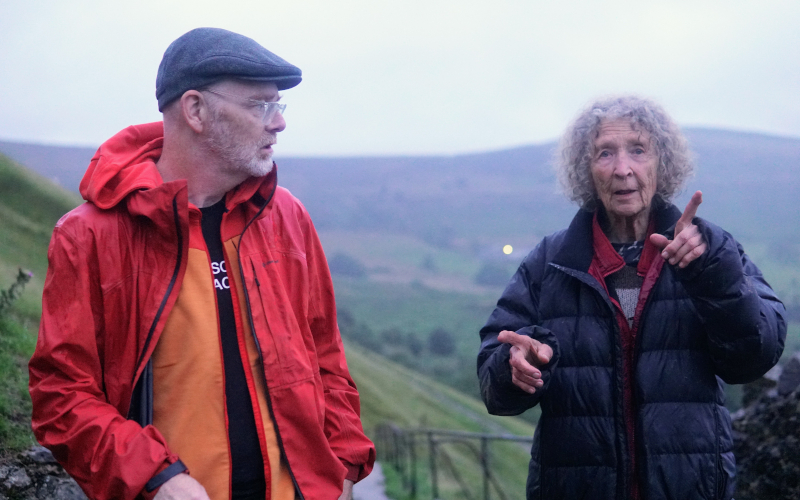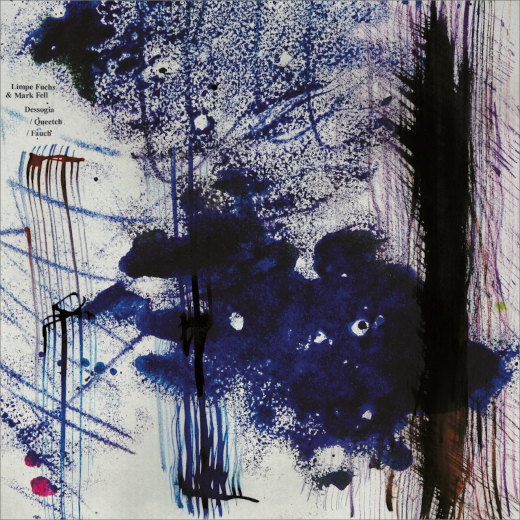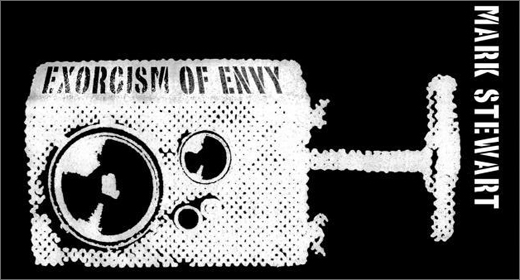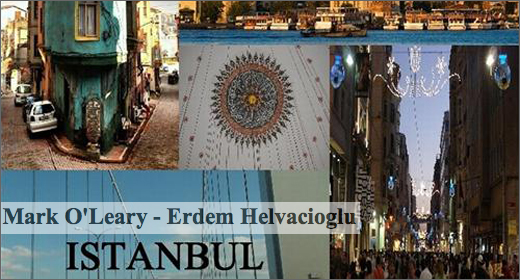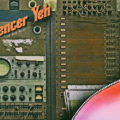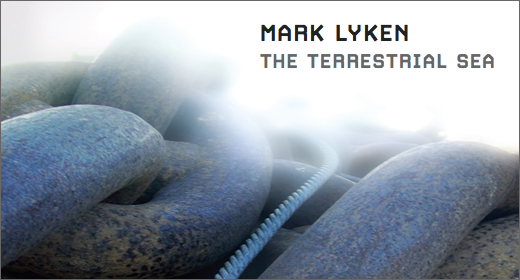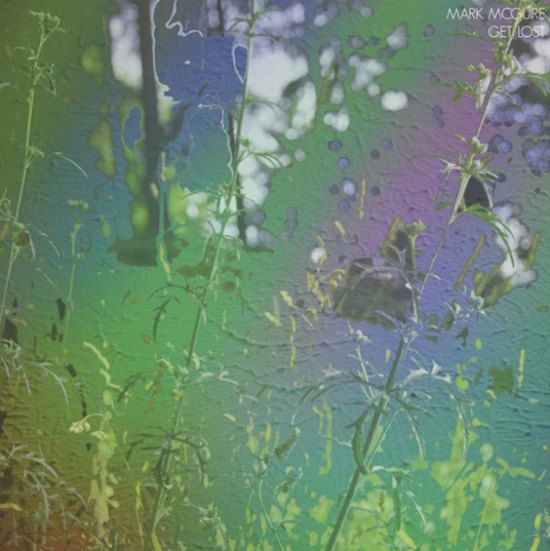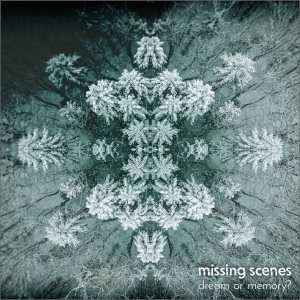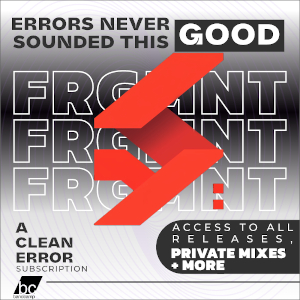At the send+receive Festival of Sound, Limpe Fuchs first heard and appreciated the music of Mark Fell, planting the seed of a collaboration that came to fruition when Fell (along with his son Rian Treanor) visited Fuchs at her home in Peterskirchen, Germany in September 2022. Black Truffle announced the release of the results of this extensive session in the audacious form of a triple LP, housing over two hours of music across its six sides titled Dessogia / Queetch / Fauch.
Two of the great mavericks of contemporary music
The 2015 edition of Winnipeg’s send+receive Festival of Sound, focused on rhythm, turned out to be a generative meeting of minds. There, Mark Fell encountered the music of Will Guthrie, a meeting that was eventually to result in the frenetic acoustic drumkit and digital synthesis pairing heard on Infoldings and Diffractions (2020). At the same festival, Limpe Fuchs first heard and appreciated the music of Mark Fell, planting the seed of a collaboration that came to fruition when Fell (along with his son Rian Treanor) visited Fuchs at her home in Peterskirchen, Germany in September 2022. Black Truffle announced the release of the results of this extensive session in the audacious form of a triple LP, housing over two hours of music across its six sides titled Dessogia / Queetch / Fauch.
The collaboration might appear unlikely: what common ground could exist between Fuchs, classically trained pianist, legend of improvised music, instrument builder and sound sculptor active since the 1960s, whose group Anima Sound connected the dots between free jazz, krautrock and ritual, and Fell, proponent of radical computer music, known for his bracingly austere productions that twist remnants of club music into algorithmic stutters? For all their seeming disparity in technology, approach and background, the music on Dessogia / Queetch / Fauch makes it immediately evident the pair share a great deal in their essentially percussive approach and ability to, in Fuch’s phrase, ‘establish silence.’
Recording at her home studio, Fuchs had the use of her entire array of instruments, found, invented, and traditional, and treats the listener to some that don’t often make their way to concerts, including extensive passages performed (with Gundis Stalleicher) on pieces of wooden parquetry. Alongside metallic, wooden and skin percussion of all kinds, sounded and struck in every conceivable way, we also hear bamboo flute, viola, and Fuchs’ distinctive free-form vocalisations. Fell also stretched himself, with his contributions ranging from characteristically fizzing pitched percussive pops to swarms of sliding tones and abstract digital noise.
Showing both remarkable restraint and improvisational freedom, much of the music consists of duets between a single percussion instrument and a distinctive mode of digital sound, often lingering in one timbral-rhythmic space for minutes at a time. Improvisational forward momentum coexists with a free-floating, wandering quality. On opener “Dessogia I,” the shimmering almost-gilssandi tones of Fuchs’ enormous set of microtonally tuned metal tubes ripples across Fell’s rubbery pulse, which moves up the frequency spectrum as Fuchs becomes more animated and switches to horn. At some points, as on the metallic chiming tones that open “Fauch I,” only the unexpected dynamic behaviour of Fell’s sounds distinguish them from Fuchs’ acoustic instruments. At others, like on “Queetch III,” the waves of sliding tones and noise textures are bracingly synthetic, joined by piercing squeaks and scrapes from Fuchs’ metal objects.
Epic in scope, immersing the listener in an entirely distinctive world of sounds, and thrillingly bold in its melding of the most ancient musical procedures with cutting edge technologies, Dessogia / Queetch / Fauch is an unexpected major statement from two of the great mavericks of contemporary music.
Introductory text by Oren Ambarchi.
Photos by Anna Dengscherz.
Below Q&A by Joeri Bruyinckx.
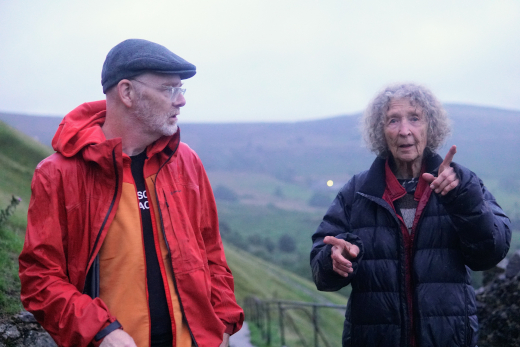
Igloo :: When you and Limpe got to know each other during the send+receive Festival, what was the point or the reason to decide: “We should do something together, we should work together“?
Mark Fell :: I think we were only introduced to each other at that point. I don’t think we spoke much to each other.
Did you know Limpe’s work?
Mark Fell :: I partially new of her work. But only in the most vague terms.
In a way, you and Limpe come from very different backgrounds: another country, another generation, another musical background. What were you looking for in this collaboration? Are you looking more for contrast than for things you have in common?
Mark Fell :: I’m not sure how to talk about this. it’s clear we are from different times and musical places. Generally I am not drawn to working with people who have a very similar aesthetic-history-approach to me. But I’m not really trying to look for any specific thing but more to see what comes out. The music is unknowable and unimaginable in advance — the music imagines itself. I make an effort not to be too aesthetically or methodologically rigid. Having worked with lots of people from many different backgrounds, I think I’ve got better at this. I feel like collaboration is almost a kind of form of study of creative process ù how things evolve and form themselves, and how we described this. So I try to always be aware of what I am encountering and what I am learning — about myself and the process.
You eventually went to Limpe’s house to play and record. Why? Why did you decide that this would be the best way to do this? Out of practical reason’s; because it’s easier for you to go to Germany with a laptop than for her to move her instruments to England?
Mark Fell :: I had invited Limpe to perform at some events I was curating. we got on and I loved her spirit. then at some point the opportunity to perform together came about. I invited her to the UK to do two shows where I did multichannel sound and she played her instruments. These went really well.
Then she invited me to her home and studio. Although the live projects were good I felt a studio project would give us more time to play together and explore. Which is what we did. practically yes I made sense for me to travel to Bavaria. I had been in the Pyrenees with my son Rian and CMV Hauswolf. then me and Rian met Will Guthrie at Willisaw Jazz Festival. Then a train to Bavaria.
What are your memories of the time you spent together in Limpe’s home studio? How do you remember your time in Germany?
Mark Fell :: We arrived in Munich in the evening. The sound engineer met us and drove to Limpe’s place. A tiny village surrounded by fields and forests. We got totally lost. When we finally found the pharhoff, it was late, and we were relived to see Limpe wandering around looking for us. The place has such a strong character and history. A big old monastery like building with barns and outbuildings. I think there’s an old Popul Vuh film shot there. We set up mics and our equipment in one of the large rooms.
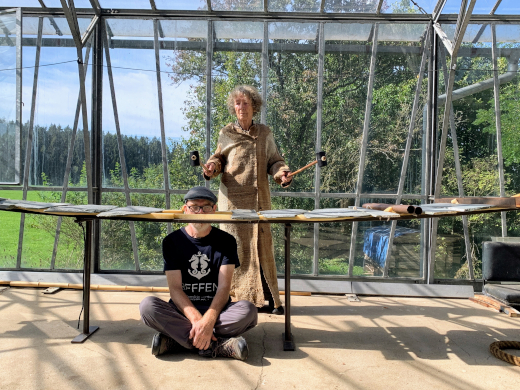
How much time did you spent together?
Mark Fell :: I think we were there for just under two weeks. And we spend most of the time playing and recorded everything. So there was a lot of material. We had some breaks to walk in the forest. And at one point me and Rian spent a day trekking in the Alps. We are keen walkers.
Of the recorded material, how do you decide what will eventually use for a release? Do you just pick out the best parts? Or do you go for the parts which fit together the best, which could make a good ‘story‘ or a ‘narrative‘ as an album?
Mark Fell :: As we played more and more I realized this could be more than a single album, then a double, then a triple. it’s important that this record is long form, because to encounter this music for 18minutes then turn the side looses the temporal expanse that is core to the project — days and days of playing as a way of being together.
This album appears as a 3LP. Is this important to you? I mean; that there’s still a physical object of a release (in times when most music is ‘just‘ digital? Do you still buy music on vinyl (or CD or tape) yourself? Do you still put records on at home?
Mark Fell :: I have never liked CDs as a way of playing music. But I was a vinyl “junky” as a teenage and young adult. Music was a way of life. So yeah these days I don’t buy as much music. But I regularly buy records and I listen to vinyl at home. Books, vinyl, tea — that’s my safe space.
Dessogia / Queetch / Fauch is available on Black Truffle. [Bandcamp]






